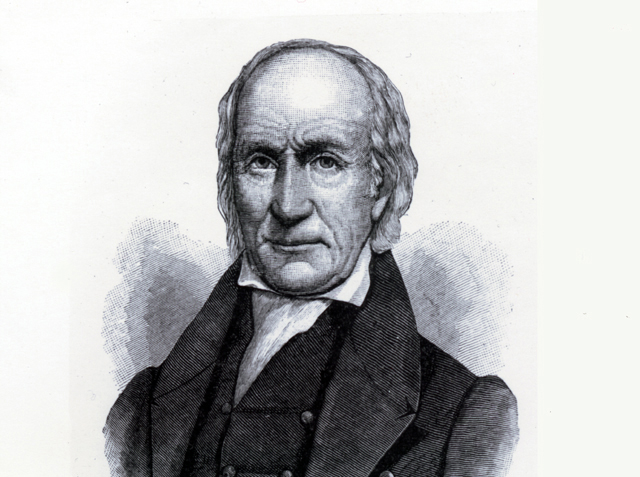Elder John Leland
(1754–1841)
Though Elder Leland was a part of the "anti-mission" side (Old School or Hardshell) in the 1830s, he did not hold to the anti means view of regeneration, but preached to the lost in order that they might, by the preaching of the gospel, be converted or born again. When Leland identified with the anti-mission side it was because he opposed mission societies which were not under the supervision of churches, and against theological seminaries, and certain revival methods, and Arminian principles. It was not because he rejected a belief in means. One of the chapters in the book "The Hardshell Baptist Cult" is Chpt. 49 - Elder Leland's Preaching (here) and the following are some citations from that chapter.
"The Gillite mode of addressing sinners, seemed a little different from the New Testament mode. The Hopkinsian method appeared as if it took all the wisdom of God to devise a way for an honorable pretence to damn men. Dr. Fuller only cast another bundle of straw on the fire. So that the great query which has agitated my mind for more than thirty years, 'How is a congregation of sinners to be addressed?' at the time I am speaking of, fell with such distress upon my mind, that I could hardly contain myself. But in the midst of my difficulties, I had a meeting at a school house; in the time of service my soul got into the trade winds, and without consulting Gill, Hopkins, Fuller, or Wesley, without comparing our translation with the Septuagint, Chaldee, or the King of Spain's Bible, I addressed the scholars and young people in a way I never can without God helps me. The spirit of the Lord fell upon them. Very soon after this, five of them came forward and confessed Christ." (Continuation of MS. 1807)
Here is what Elder Leland wrote in a letter to Elder John Taylor:
"It brings fresh to my mind the winter of 1779 and '80, which, was the coldest winter that America pas ever known; and yet, to me, it was the warmest that ever I knew. At several other periods of my life, I have had more success than I had at that time, but never had the spirit of prayer and travail for souls, to an equal degree."Leland writes further, in his letter, saying:
"Whenever I had evidence that God had blessed my imperfect labors for the salvation of sinners, it has given me much more joy than the favors of the rich, or the applauses of the great."
I love how Elder Leland closed out his letter to Elder Taylor.
"Rev. John Taylor, who lives, or ought to live, in the town of Regeneration, Grace-street, Penitent alley, at the sign of the cross, and next to glory."
Said one source on the biography of Leland (See here):
"1. Leland was an active and productive pastor. From the age of 18 until his death at 86, he preached approximately 8,000 sermons, wrote numerous hymns, published about 30 pamphlets, and baptized 1,524 people. He also personally knew 962 pastors, out of which 303 he heard preach and 207 who visited him at his home."
2. Leland had an outsized influence on the establishment of religious liberty in America through his relationship with James Madison, the primary author of the U.S. Constitution. Leland, who was considered the “leader of the Virginia Baptists,” helped Madison get elected both as a delegate to the Constitutional Convention and to the first Congress. Madison repaid Leland and the other Baptists by keeping his campaign promise to support a Bill of Rights that included the Establishment Clause.
3. For much of his early career Leland rarely spoke publicly about one of the key issues of his day—slavery. However, on returning to his home state of Massachusetts in 1791, he began to forcefully champion the emancipation of slaves. Leland thought the cause of freedom for Black Americans would be an opportunity for Christian youth:
Although he continued to oppose slavery, Leland later in life began to denounce abolitionists as troublemakers. Many slaveholders, he said, “in heart are opposed to slavery, and would gladly set their slaves free, if they could be provided for.”
"When he arrived in the capitol, Leland was invited to preach a message of religious liberty before Congress."
5. According to L. H. Butterfield, Leland was “dubious about seminaries and campaigns for [missionary] funds.” Although Leland, who was self-educated, was not opposed to secular education, he purportedly stuck “to the primitive Baptist principle that the power to evangelize is bestowed by divine rather than human means.”
“In these things, however, I may be wrong,” Leland told a friend, “for I claim neither infallibility nor the spirit of prophecy. — May I, may you, may every one pray and search for himself, and believe, and act, and follow the clearest light." (emphasis mine)
This confession "I may be wrong" is similar to the later thinking of Elder John Taylor of Kentucky, who at first was an anti missionary but later became sympathetic towards mission societies.
If Leland could see how the "Primitive Baptist Church" has evolved since his day, he surely would denounce them as a cult.

No comments:
Post a Comment